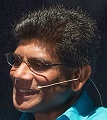When my first daughter was about six years old, I took her fishing for the first time in a small pond near Amherst, Massachusetts. I bought two fishing rods from a local K-Mart and headed to a nearby pond with her. I read all of the fishing rod instructions and followed the entire procedure carefully, but baiting the hook with worms seemed harder than solving a differential equation. A friendly neighbor saw my struggle and helped me out.
Our first catch was a small sunfish. As soon as we got it out of the pond, it all got very messy: the fish was writhing in pain. I didn’t know how to remove the hook and release the fish safely. As a result, the fish died. We spent some more time there catching and releasing different fishes.
I didn’t enjoy my first fishing experience at all—and my daughter hated it. Though she was only six, she said to me very clearly in her sweet but firm voice, “Dad, I don’t want to fish anymore.” That was our last fishing trip. My child knew intuitively that the fish were suffering.
Interestingly, 20 years later, she was the one who asked to me read this book. What A Fish Knows: The Inner Lives of Our Underwater Cousins by Jonathan Balcombe is of the most enlightening books I have ever read, and the one that made me view the world of fish with respect, humility and astonishment.
You can read the rest of Dr. Jawaharlal’s essay at:
https://www.huffingtonpost.com/dr-mariappan-jawaharlal/book-review-what-a-fish-k_b_11796698.html

